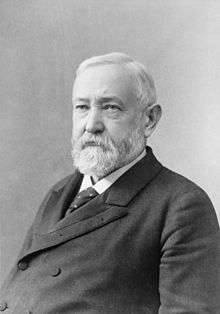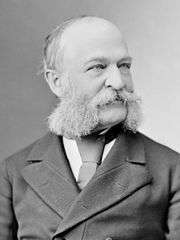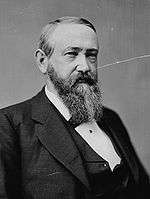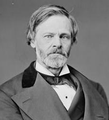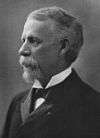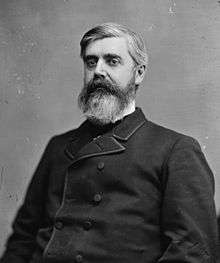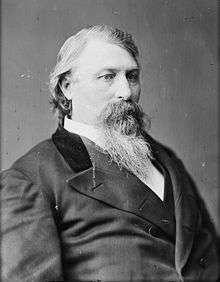1888 Republican National Convention
|
1888 presidential election | |
|
Nominees Harrison and Morton | |
| Convention | |
|---|---|
| Date(s) | June 19–25, 1888 |
| City | Chicago, Illinois |
| Venue | Auditorium Theatre |
| Chair | Morris M. Estee |
| Candidates | |
| Presidential nominee | Benjamin Harrison of Indiana |
| Vice Presidential nominee | Levi P. Morton of New York |
| Other candidates |
John Sherman Russell A. Alger Walter Q. Gresham |
| Voting | |
| Total delegates | 832 |
| Votes needed for nomination | 417 |
| Results (President) |
Harrison (IN): 544 (65.38%) Sherman (OH): 118 (14.18%) Gresham (IN): 59 (7.09%) Alger (MI): 100 (12.02%) Blaine (ME): 5 (0.60%) McKinley (OH): 4 (0.48%) Douglass (MD): 1 (0.12%) Others: 1 (0.12%) |
| Results (Vice President) |
Morton (NY): 592 (71.15%) Phelps (NJ): 119 (14.3%) Bradley (KY): 103 (12.38%) Bruce (MS): 11 (1.32%) Abstaining: 6 (0.72%) Walter S. Thomas: 1 (0.12%) |
| Ballots | 8 |
The 1888 Republican National Convention was a presidential nominating convention held at the Auditorium Building in Chicago, Illinois, on June 19–25, 1888. It resulted in the nomination of former Senator Benjamin Harrison of Indiana for President and former Representative Levi P. Morton of New York for Vice President. During the convention, Frederick Douglass was invited to speak and became the first African-American to have his name put forward for a presidential nomination, in a major party's roll call vote, receiving one vote from Kentucky on the fourth ballot.
The ticket won in the election of 1888, defeating President Grover Cleveland and former Senator Allen G. Thurman from Ohio.
Issues addressed
Issues addressed in the convention included support for protective tariffs, repeal of taxes on tobacco, support for the use of gold and silver as currency and support for pensions for veterans. The party also expressed its opposition to polygamy.[1]
Presidential nomination
-
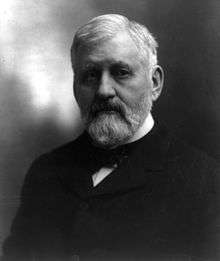
U.S. Senator
William B. Allison
of Iowa
(Withdrew after 7th Ballot) -
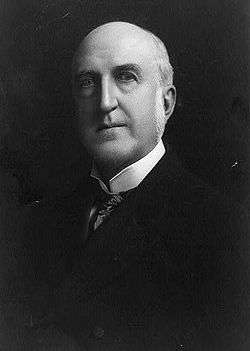
NYC RR President
Chauncey Depew
of New York
(Withdrew after 3rd Ballot) -
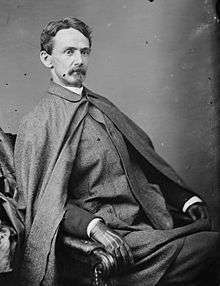
U.S. Senator
John J. Ingalls
of Kansas
(Not Formally Nominated) -
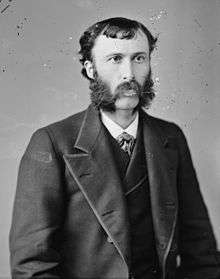
Representative
William Walter Phelps
of New Jersey
(Not Formally Nominated) -
.jpg)
Mayor
Edwin Henry Fitler
of Pennsylvania
(Withdrew after 1st Ballot) -
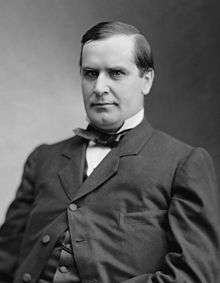
Representative
William McKinley
of Ohio
(Not Formally Nominated)
(Endorsed John Sherman) -
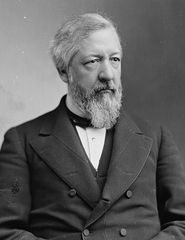
Secretary
James G. Blaine
of Maine
(Declined to Contest)
| Presidential Ballot | ||||||||
| Ballot | 1st | 2nd | 3rd | 4th | 5th | 6th | 7th | 8th |
|---|---|---|---|---|---|---|---|---|
| Benjamin Harrison | 80 | 91 | 94 | 217 | 213 | 231 | 278 | 544 |
| John Sherman | 229 | 249 | 244 | 235 | 224 | 244 | 231 | 118 |
| Russell A. Alger | 84 | 116 | 122 | 135 | 142 | 137 | 120 | 100 |
| Walter Q. Gresham | 111 | 108 | 123 | 98 | 87 | 91 | 91 | 59 |
| William B. Allison | 72 | 75 | 88 | 88 | 99 | 73 | 76 | 0 |
| Chauncey Depew | 99 | 99 | 91 | 0 | 0 | 0 | 0 | 0 |
| James G. Blaine | 35 | 33 | 35 | 42 | 48 | 40 | 15 | 5 |
| John James Ingalls | 28 | 16 | 0 | 0 | 0 | 0 | 0 | 0 |
| Jeremiah McLain Rusk | 25 | 20 | 16 | 0 | 0 | 0 | 0 | 0 |
| William Walter Phelps | 25 | 18 | 5 | 0 | 0 | 0 | 0 | 0 |
| Edwin Henry Fitler | 24 | 0 | 0 | 0 | 0 | 0 | 0 | 0 |
| William McKinley | 2 | 3 | 8 | 11 | 14 | 12 | 16 | 4 |
| Robert Todd Lincoln | 3 | 2 | 2 | 1 | 0 | 0 | 2 | 0 |
| Samuel Freeman Miller | 0 | 0 | 2 | 0 | 0 | 0 | 0 | 0 |
| Joseph B. Foraker | 0 | 0 | 0 | 1 | 0 | 1 | 1 | 0 |
| Frederick Douglass | 0 | 0 | 0 | 1 | 0 | 0 | 0 | 0 |
| Frederick Dent Grant | 0 | 0 | 0 | 0 | 0 | 1 | 0 | 0 |
| Creed Haymond | 0 | 0 | 0 | 0 | 1 | 0 | 0 | 0 |
Vice Presidential nominaion
Former United States Senator Levi P. Morton from Ohio was asked if he wanted the second spot. He had been asked in 1880, but had declined. This time Morton decided to accept.
| Vice Presidential Ballot | |
| Ballot | 1st |
|---|---|
| Levi P. Morton | 591 |
| William Walter Phelps | 119 |
| William O'Connell Bradley | 103 |
| Blanche K. Bruce | 11 |
| Walter F. Thomas | 1 |
Accusation of delegate vote-buying
Nearly a decade later, Ohio candidate John Sherman accused Michigan candidate, millionaire Russell A. Alger, of buying the votes of Southern delegates who had already confirmed their vote for Sherman. In Sherman's 1895 two-volume book "Recollections" he asserted, "I believe, and had, as I thought, conclusive proof, that the friends of Gen. Alger substantially purchased the votes of many of the delegates from the Southern States who had been instructed by their conventions to vote for me." Once accused, Alger submitted correspondence to the New York Times, who published one letter from 1888, written after the convention to Alger, where Sherman states, "if you bought some [votes], according to universal usage, surely I don't blame you." Later in the same New York Times article, Alger insisted neither he or friends bought a single vote. The article also quotes another delegate, James Lewis, who claimed that "the colored delegates of the South will unite on a Union soldier in preference" instead of a civilian.[2]
When Sherman introduced his anti-trust legislation two years later, his main example of unlawful combination drew from a Michigan Supreme Court case involving Diamond Match Company and Alger's participation as president and stock holder.[3]
See also
References
- ↑ Official Proceedings of the Republican National Convention Held at Chicago, June 19, 20, 21, 22, 23 and 25, 1888
- ↑ ALGER ANSWERS SHERMAN; Denial that Southern Delegates Sold Their Votes. THE SENATOR'S CHARGES REFUTED In an Autograph Letter He Practically Withdrew His Charge of Unfairness -- Gen. Sherman Not Opposed to the Purchase of Votes.
- ↑ SHERMAN TO ALGER.
External links
- Republican Party platform of 1888 at The American Presidency Project
- Harrison acceptance letter at The American Presidency Project
| Preceded by 1884 Chicago |
Republican National Conventions | Succeeded by 1892 Minneapolis |
